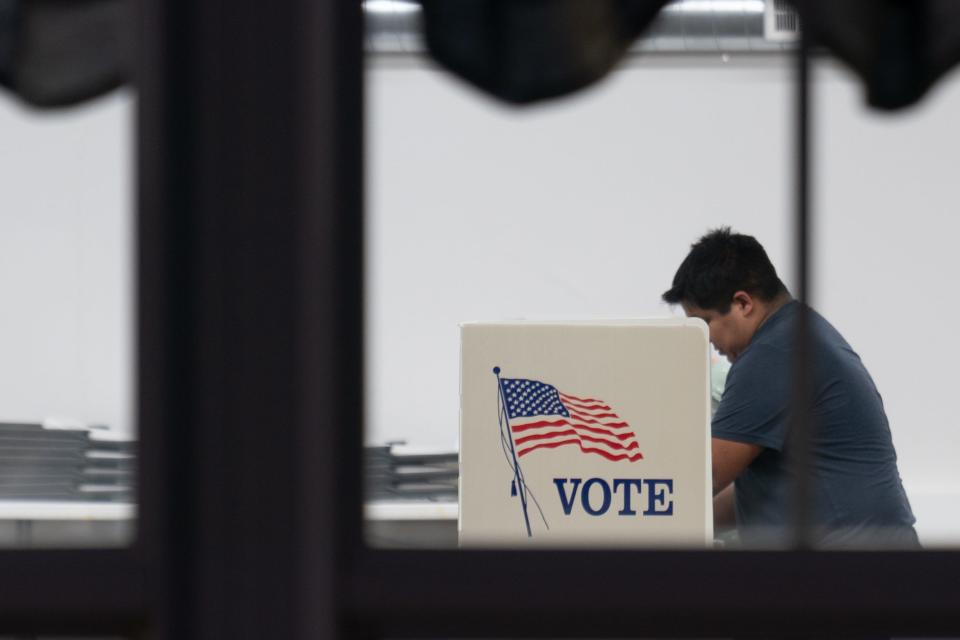Kansas officials want to amend election law after Supreme Court sided with voter advocates
- Oops!Something went wrong.Please try again later.
- Oops!Something went wrong.Please try again later.
After lawmakers enacted an election law in 2021 without having it go through the normal committee process, legislators have now held a hearing on a proposed change in an attempt to resolve a long-running lawsuit ahead of the 2024 elections.
The offices of Secretary of State Scott Schwab and Attorney General Kris Kobach, who were on the losing side of a Kansas Supreme Court decision in December, are asking lawmakers to amend the law.
Representatives of the two state officers said House Bill 2618 should alleviate the constitutionality concerns that the high court unanimously expressed. But the voter advocacy organizations that are suing Schwab and Kobach say the bill does not go far enough to address their concerns.
The bill could affect the 2024 elections, as Loud Light and the League of Women Voters seek to resume voter registration activities, and as election officials seek to maintain the integrity of elections.
It also could affect the ongoing lawsuit, which is back on the Supreme Court's docket next week.

"Ongoing litigation poses a risk to the statute as currently enacted," said Dan Burrows, the chief deputy attorney general, in written testimony to the House Elections Committee on Tuesday.
"If the Attorney General wished to remove the offensive and vague language from the 2021 bill to settle the law suit," wrote Cille King, of the League of Women Voters of Kansas, "he might have done it earlier during these last two years instead of waiting until the week before the Kansas Supreme Court was to hear the case."
If the law were overturned, it could hurt efforts to combat fraud, Burrows said. So amending the law to clarify its scope will help "ensure the integrity of the 2024 Election."
The law can help combat financial scams by people giving the impression they are election officials in order to steal money, said Clay Barker, a deputy secretary of state and the office's general counsel. Davis Hammet, of Loud Light, argued such criminal activity is already covered by other laws.
Elections bill is response to lawsuit and Supreme Court ruling
The House Elections Committee and its counterpart in the Senate never held hearings on the 2021 statute, which was done through a Senate floor amendment and subsequent conference committee, meaning there was never a chance for public testimony. Republican supermajorities then enacted House Bill 2183 over the veto of Democratic Gov. Laura Kelly.
Loud Light and the League of Women Voters stopped holding voter registration drives because of the law. They have not resumed direct voter registration efforts.
"Until we have that clarity, we cannot in good conscience send out people out to potentially be arrested across the state," Hammet said.
King said local leagues were told not to register voters until the courts issued an injunction, which has not happened.
They also sued Schwab and Kobach, arguing that the law potentially criminalized voter registration drives by making it a felony to impersonate an election official, even if it was unintentional. The Supreme Court in December indicated that the current law may be an unconstitutionally vague limit on free speech.
The new bill, which was introduced at the request of Kobach's office, would require intent for the crime of false representation of an election official.
The bill "was drafted to promptly address that concern by adding an explicit 'intent' element into the existing law," Barker wrote. "That is, for a crime to occur, the government must prove beyond a reasonable doubt that the person intended to cause another to believe that the person was an election official."
Hammet said he appreciates that the attorney general and secretary of state now recognize that "the current statute is broad and vague, something that we've been arguing in court for years and they have disagreed with until this moment."
For instance, he said, it is unclear if it is illegal to set up a table with the state's official voter registration forms that may have a government seal on them.
"Even under this bill, which would in many ways be an improvement, it's still not exactly clear what conduct is illegal," Hammet said.
Rep. Pat Proctor, R-Leavenworth and the elections committee chair, said he doesn't think the new bill is vague.
"What this bill actually does is take away the possibility that you could be charged for just giving the appearance and replacing it with the fact that you have to have the intent to cause a person to believe that the person engaging in the conduct is an election official," he said.
Jason Alatidd is a Statehouse reporter for the Topeka Capital-Journal. He can be reached by email at jalatidd@gannett.com. Follow him on X @Jason_Alatidd.
This article originally appeared on Topeka Capital-Journal: Kansas Supreme Court ruling on election law prompts legislative action

